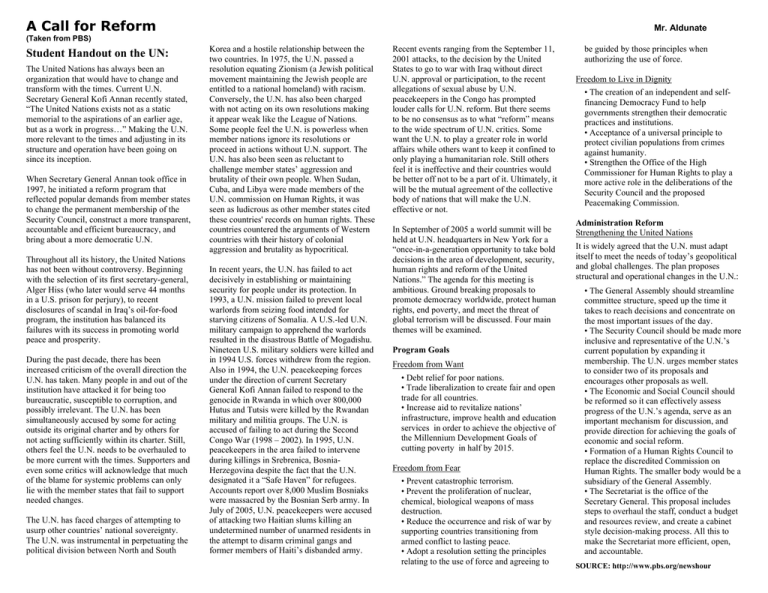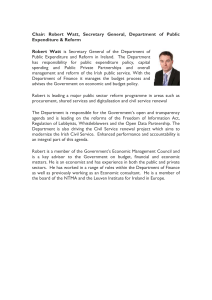A Call for Reform Student Handout on the UN:
advertisement

A Call for Reform Mr. Aldunate (Taken from PBS) Student Handout on the UN: The United Nations has always been an organization that would have to change and transform with the times. Current U.N. Secretary General Kofi Annan recently stated, “The United Nations exists not as a static memorial to the aspirations of an earlier age, but as a work in progress…” Making the U.N. more relevant to the times and adjusting in its structure and operation have been going on since its inception. When Secretary General Annan took office in 1997, he initiated a reform program that reflected popular demands from member states to change the permanent membership of the Security Council, construct a more transparent, accountable and efficient bureaucracy, and bring about a more democratic U.N. Throughout all its history, the United Nations has not been without controversy. Beginning with the selection of its first secretary-general, Alger Hiss (who later would serve 44 months in a U.S. prison for perjury), to recent disclosures of scandal in Iraq’s oil-for-food program, the institution has balanced its failures with its success in promoting world peace and prosperity. During the past decade, there has been increased criticism of the overall direction the U.N. has taken. Many people in and out of the institution have attacked it for being too bureaucratic, susceptible to corruption, and possibly irrelevant. The U.N. has been simultaneously accused by some for acting outside its original charter and by others for not acting sufficiently within its charter. Still, others feel the U.N. needs to be overhauled to be more current with the times. Supporters and even some critics will acknowledge that much of the blame for systemic problems can only lie with the member states that fail to support needed changes. The U.N. has faced charges of attempting to usurp other countries’ national sovereignty. The U.N. was instrumental in perpetuating the political division between North and South Korea and a hostile relationship between the two countries. In 1975, the U.N. passed a resolution equating Zionism (a Jewish political movement maintaining the Jewish people are entitled to a national homeland) with racism. Conversely, the U.N. has also been charged with not acting on its own resolutions making it appear weak like the League of Nations. Some people feel the U.N. is powerless when member nations ignore its resolutions or proceed in actions without U.N. support. The U.N. has also been seen as reluctant to challenge member states’ aggression and brutality of their own people. When Sudan, Cuba, and Libya were made members of the U.N. commission on Human Rights, it was seen as ludicrous as other member states cited these countries' records on human rights. These countries countered the arguments of Western countries with their history of colonial aggression and brutality as hypocritical. In recent years, the U.N. has failed to act decisively in establishing or maintaining security for people under its protection. In 1993, a U.N. mission failed to prevent local warlords from seizing food intended for starving citizens of Somalia. A U.S.-led U.N. military campaign to apprehend the warlords resulted in the disastrous Battle of Mogadishu. Nineteen U.S. military soldiers were killed and in 1994 U.S. forces withdrew from the region. Also in 1994, the U.N. peacekeeping forces under the direction of current Secretary General Kofi Annan failed to respond to the genocide in Rwanda in which over 800,000 Hutus and Tutsis were killed by the Rwandan military and militia groups. The U.N. is accused of failing to act during the Second Congo War (1998 – 2002). In 1995, U.N. peacekeepers in the area failed to intervene during killings in Srebrenica, BosniaHerzegovina despite the fact that the U.N. designated it a “Safe Haven” for refugees. Accounts report over 8,000 Muslim Bosniaks were massacred by the Bosnian Serb army. In July of 2005, U.N. peacekeepers were accused of attacking two Haitian slums killing an undetermined number of unarmed residents in the attempt to disarm criminal gangs and former members of Haiti’s disbanded army. Recent events ranging from the September 11, 2001 attacks, to the decision by the United States to go to war with Iraq without direct U.N. approval or participation, to the recent allegations of sexual abuse by U.N. peacekeepers in the Congo has prompted louder calls for U.N. reform. But there seems to be no consensus as to what “reform” means to the wide spectrum of U.N. critics. Some want the U.N. to play a greater role in world affairs while others want to keep it confined to only playing a humanitarian role. Still others feel it is ineffective and their countries would be better off not to be a part of it. Ultimately, it will be the mutual agreement of the collective body of nations that will make the U.N. effective or not. In September of 2005 a world summit will be held at U.N. headquarters in New York for a “once-in-a-generation opportunity to take bold decisions in the area of development, security, human rights and reform of the United Nations.” The agenda for this meeting is ambitious. Ground breaking proposals to promote democracy worldwide, protect human rights, end poverty, and meet the threat of global terrorism will be discussed. Four main themes will be examined. Program Goals Freedom from Want • Debt relief for poor nations. • Trade liberalization to create fair and open trade for all countries. • Increase aid to revitalize nations’ infrastructure, improve health and education services in order to achieve the objective of the Millennium Development Goals of cutting poverty in half by 2015. Freedom from Fear • Prevent catastrophic terrorism. • Prevent the proliferation of nuclear, chemical, biological weapons of mass destruction. • Reduce the occurrence and risk of war by supporting countries transitioning from armed conflict to lasting peace. • Adopt a resolution setting the principles relating to the use of force and agreeing to be guided by those principles when authorizing the use of force. Freedom to Live in Dignity • The creation of an independent and selffinancing Democracy Fund to help governments strengthen their democratic practices and institutions. • Acceptance of a universal principle to protect civilian populations from crimes against humanity. • Strengthen the Office of the High Commissioner for Human Rights to play a more active role in the deliberations of the Security Council and the proposed Peacemaking Commission. Administration Reform Strengthening the United Nations It is widely agreed that the U.N. must adapt itself to meet the needs of today’s geopolitical and global challenges. The plan proposes structural and operational changes in the U.N.: • The General Assembly should streamline committee structure, speed up the time it takes to reach decisions and concentrate on the most important issues of the day. • The Security Council should be made more inclusive and representative of the U.N.’s current population by expanding it membership. The U.N. urges member states to consider two of its proposals and encourages other proposals as well. • The Economic and Social Council should be reformed so it can effectively assess progress of the U.N.’s agenda, serve as an important mechanism for discussion, and provide direction for achieving the goals of economic and social reform. • Formation of a Human Rights Council to replace the discredited Commission on Human Rights. The smaller body would be a subsidiary of the General Assembly. • The Secretariat is the office of the Secretary General. This proposal includes steps to overhaul the staff, conduct a budget and resources review, and create a cabinet style decision-making process. All this to make the Secretariat more efficient, open, and accountable. SOURCE: http://www.pbs.org/newshour Mr. Aldunate THE UNITED NATIONS AND REFORM Questions: 1. Comment on the statement: “The whole is only as strong as the sum of its parts” and whether this statement is true for the United Nations. 2. Discuss whether you feel the U.N.’s power should be increased to have enforcement authority over any nation or should it be decreased to only provide humanitarian aid when asked. 3. Should the five permanent members of the Security Council continue to retain their veto power? Why or why not? 4. The end of the Cold War changed the purpose of the U.N.’s original mission to prevent another world war. Do you agree or disagree with the statement and why? 5. Can the U.N. in its current configuration and operation of existing programs be effective in preventing global terrorism? Explain your answer. 6. Do you feel the right issues are being discussed at the world summit to address some of the criticism facing the U.N.? Explain you answer. 7. Overall do you feel the U.N. is a successful organization? Why or why not. Cite examples to support your view. SOURCE: http://www.pbs.org/newshour




